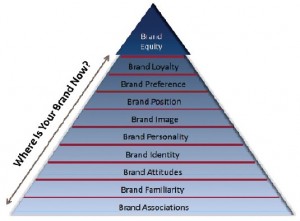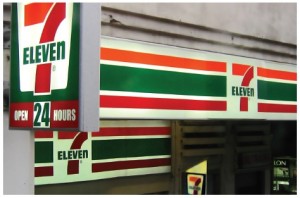Do You Know What Is Brand Equity?  Brand equity in simple terms is the added value a brand name receives compared to an equivalent generic product. It is the extra value that consumers give to Colgate as compared to generic toothpaste and Apple’s iPhone as compared to a generic smartphone. Several factors that go towards creating or enhancing brand equity includes brand awareness, brand understanding, brand loyalty, brand personality and brand associations. These qualitative aspects of brand equity add up to form the power of a brand that will be experienced by consumers.
Brand equity in simple terms is the added value a brand name receives compared to an equivalent generic product. It is the extra value that consumers give to Colgate as compared to generic toothpaste and Apple’s iPhone as compared to a generic smartphone. Several factors that go towards creating or enhancing brand equity includes brand awareness, brand understanding, brand loyalty, brand personality and brand associations. These qualitative aspects of brand equity add up to form the power of a brand that will be experienced by consumers.
The perceived premium that successful brand names holds over generic or less mainstream brands places them at an advantageous spot. It can allow them to charge premium pricing and attract consumers’ attention easily by making use of their successful brand names. Consumers are more likely to know more about a successful brand including its product offering, brand history and values and brand associations for brands with high brand equity. This is advantageous for brands who are looking for franchisees as the known information about the brands allow investors to filter out the businesses that they do not find in-line with their long term business goals or are simply not suitable for them.
In the process of creating brand equity, the business is not only connecting to consumers through their tangible brand assets such as logos and taglines. In addition, it also heightens the intensity of intangible assets for instance, brand preference, brand reputation and brand familiarity from consumers. Through connecting with the consumers at large, businesses are in fact promoting themselves to potential franchisees. Potential franchisees are likely to assess franchise opportunities based on their perceived potential and sustainability of a brand and business idea in the long run.
 Two-way Interaction Between Franchisor and Franchisee Brand equity is important as it enhances competitive advantage for a business from its recognized brand name. This particular factor is one reason why potential franchisees are keener on well-known businesses with a good brand name. The brand equity arising from the business lowers publicity and advertising costs for new start-ups, gains from consumers’ awareness from other franchised shops with a similar brand name and saves time and money on building up recognition and reputation from nothing. Franchising an appropriate business with its brand equity allows the franchisees to ride on the waves of the brand name’s status acquired over the years.
Two-way Interaction Between Franchisor and Franchisee Brand equity is important as it enhances competitive advantage for a business from its recognized brand name. This particular factor is one reason why potential franchisees are keener on well-known businesses with a good brand name. The brand equity arising from the business lowers publicity and advertising costs for new start-ups, gains from consumers’ awareness from other franchised shops with a similar brand name and saves time and money on building up recognition and reputation from nothing. Franchising an appropriate business with its brand equity allows the franchisees to ride on the waves of the brand name’s status acquired over the years.
For businesses looking at expanding through franchising, finding the right franchisees as business partners is crucial for further expansion and operational flow. Businesses are unwilling to partner with franchisees that delay payment of royalty fees, are dishonest with financial details for commission payment, are not running business operations accordingly or are only there to learn the secret of the trade. Brand equity aids in selecting the appropriate franchisees that can fit into and sustain the business culture.
On a micro level, delaying royalty fee payments and dishonesty with any commission payment will only affect the franchise business financially and cause displeasure with their franchisee partner. However, if business operations are not run accordingly to standards set by the franchise, it will affect the entire business and brand name on a macro level because consumers will be involved in any misdoings done by the franchisees and that may affect their perception of the business as a whole.
Consumers are not obliged to know if a business is a franchised outlet or not. If they are unhappy about inconsistent business operations or any random incidents that are not handled appropriately according to the culture advocated by the business, they are likely to give a negative opinion towards the business brand in general, rather than towards the particular business outlet. This can get tricky for businesses that are keen to expand through franchising as they will have to assure that the current level of service and/ or quality will still be achievable despite that other outlets are not being run by the original management team. 
Brand equity assists potential franchisees to decide for themselves, based on their familiarity and current knowledge about the brand and its values, to determine if a business is the right company for them or not. Franchisees are steering clear of franchising businesses that clashes with their personal goals as franchising rules may include standard opening hours (e.g. 7-Eleven to be opened 24 hours every day), standardized product offerings hence no additional items may be included without management’s approval and high royalty fees or commission rates. This facilitates the process of businesses searching for a suitable franchisee as most applicants are likely to be willing to conform to the existing organizational culture and methods.
Without a doubt, franchising as a feasible option for both franchisers who wants to expand fast or may not have enough capital to carry out expansion plans and franchisees that want to start up a ready proven business. While there may be pros and cons to both sides, it ultimately boils down to selecting a business partner that shares similar long-term business goals and values to create a sustainable and positive working relationship for the benefits of both parties.
 Florence Chan is an analyst at BDO Consultants Pte Ltd. She is currently strategizing for the International Branding Advisory department and can be contacted at fl orencechan@bdo.com.sg Tel: +65 6828 9118 Fax: +65 6828 9111 www.bdo.com.sg
Florence Chan is an analyst at BDO Consultants Pte Ltd. She is currently strategizing for the International Branding Advisory department and can be contacted at fl orencechan@bdo.com.sg Tel: +65 6828 9118 Fax: +65 6828 9111 www.bdo.com.sg






